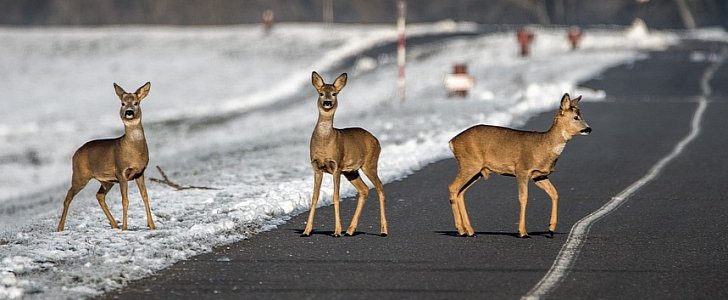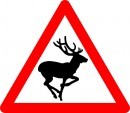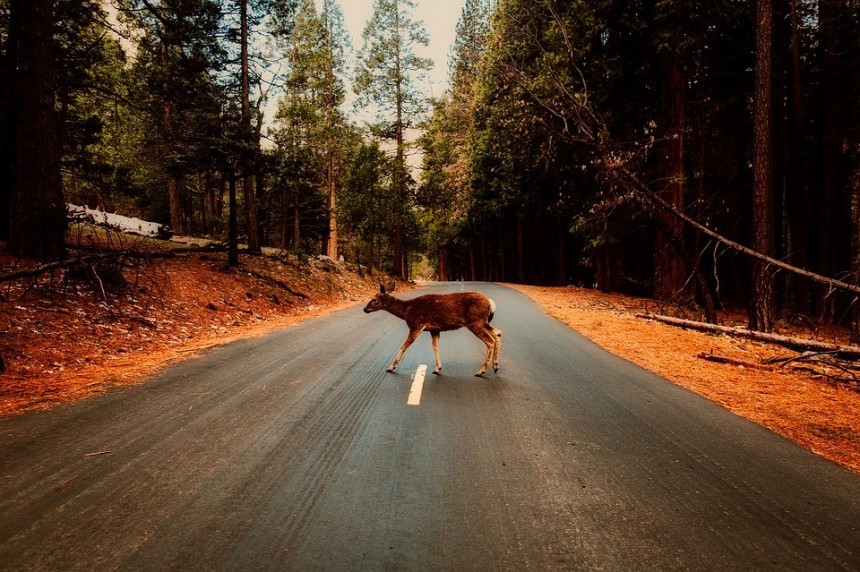There’s a sense of squeamishness attached to the idea of eating roadkill, but it’s most likely unfounded. Roadkill is actually cleaner, leaner and more environmentally friendly than any other type of meat, not to mention also being free.
So, to answer the question in the headline: yes, you should totally eat roadkill. If you’re not grossed out by the idea of picking up an animal from the road after it’s been hit by a car and especially if it’s not illegal to do so. These aren’t the only 2 conditions that have to be met in order to enjoy a more or less free meaty dinner, either.
For starters, eating roadkill is encouraged in most countries (U.K., Australia, Canada) and some U.S. states. As of October 2019, there are 29 states in the country where you can legally pick up roadkill and eat it, but regulations on what needs to be done for that to happen and what the kind of animal you can eat vary from state to state. So, if you live in the U.S. and stumble upon a deer that’s dying after being run over, hit ol’ trusty Google beforehand, to make sure you can put it in your car and have it cooked.
For instance, in California, the last state to legalize eating roadkill, you can pick up an animal that’s been hit by a car for the purpose of eating, but you have to apply for a “wildlife salvage permit” within 24 hours of finding it. And you can eat only elk, deer, pronghorn antelope or wild pig. The state is rolling out a trial of an app that would allow those interested in eating roadkill to apply for the permit online, and the law will go into effect in 2021.
In all the other 28 states, you have to notify authorities before picking the dead animal up. So hold your horses (and your deer, elk or whatever else you found) and make that call.
Legislation out of the way, there are other aspects to consider – this time, regarding your health. Fresh kill is best when it comes to roadkill: if possible, you should only eat animals that you killed yourself or that you find dying. If you come across an animal that’s been run over by someone else and has expired, look for the tell-tale signs: cloudy eyes, maggots, rotten smell or strange coloring of the flesh.
Because parasites are a concern, you should always cook roadkill thoroughly. Forget about frying a piece of meat for a few minutes in a pan or on a bbq for a juicy, rare steak: you should boil or thoroughly cook the animal to get rid of all parasites. Prior to that, you should look up a butcher or some online tutorials on how to skin and dismember roadkill – we’re talking about larger animals here, of course. If you’ve never done it before, it could be tricky.
The reward for all this trouble is that you get meat that’s very clean and very lean, fresh, high in vitamins, with no saturated fat, no drugs and no additives. It’s healthy and tasty and, perhaps just as important, it’s free – unless, of course, you killed the animal by hitting it with your own car and it took some damage, which can vary depending on what type of animal you hit.
Annually, about 1.3 million deer are hit by vehicles in the U.S. If you hit one and you pick it up from the road and take it home to cook it, it’s no different than hunting it down. Actually, there is a difference: eating roadkill is ethical.
Recent studies have shown that the most environmentally friendly diet is the vegan one, but if you can’t live without meat but do care about the climate crisis, eating roadkill may be the solution for you. Just to get an idea of how ethical it is, even People for the Ethical Treatment of Animals (PETA) approves of eating roadkill – and they hardly ever approve of anything as the rest of the world.
“Peta has no ethical objection to laws that allow the collection of an animal’s remains discovered on the side of the road,” the group says in a statement on its website. “While the best thing for animals, the environment, and human health is to go vegan, roadkill is certainly a superior option to the neatly shrink-wrapped packages of meat in the supermarket, which contain the corpses of animals who spent their lives on a filthy feedlot and were crammed on to a transport truck – and whose throats were slit in a terrifying slaughterhouse.”
That said, if you’re convinced to at least try roadkill, don’t go out looking for animals to hit with your car. Impact with larger animals like, say, a deer, can have tragic consequences – and not just for the deer. Speaking of which, authorities urge drivers to not try to swerve to avoid contact with an animal on the road, but to brake hard, hold the steering wheel and brace for the inevitable. Sometimes, bigger tragedies occur when drivers try to avoid hitting the animal and end up into oncoming traffic.
Bon appetit!
For starters, eating roadkill is encouraged in most countries (U.K., Australia, Canada) and some U.S. states. As of October 2019, there are 29 states in the country where you can legally pick up roadkill and eat it, but regulations on what needs to be done for that to happen and what the kind of animal you can eat vary from state to state. So, if you live in the U.S. and stumble upon a deer that’s dying after being run over, hit ol’ trusty Google beforehand, to make sure you can put it in your car and have it cooked.
For instance, in California, the last state to legalize eating roadkill, you can pick up an animal that’s been hit by a car for the purpose of eating, but you have to apply for a “wildlife salvage permit” within 24 hours of finding it. And you can eat only elk, deer, pronghorn antelope or wild pig. The state is rolling out a trial of an app that would allow those interested in eating roadkill to apply for the permit online, and the law will go into effect in 2021.
In all the other 28 states, you have to notify authorities before picking the dead animal up. So hold your horses (and your deer, elk or whatever else you found) and make that call.
Legislation out of the way, there are other aspects to consider – this time, regarding your health. Fresh kill is best when it comes to roadkill: if possible, you should only eat animals that you killed yourself or that you find dying. If you come across an animal that’s been run over by someone else and has expired, look for the tell-tale signs: cloudy eyes, maggots, rotten smell or strange coloring of the flesh.
The reward for all this trouble is that you get meat that’s very clean and very lean, fresh, high in vitamins, with no saturated fat, no drugs and no additives. It’s healthy and tasty and, perhaps just as important, it’s free – unless, of course, you killed the animal by hitting it with your own car and it took some damage, which can vary depending on what type of animal you hit.
Annually, about 1.3 million deer are hit by vehicles in the U.S. If you hit one and you pick it up from the road and take it home to cook it, it’s no different than hunting it down. Actually, there is a difference: eating roadkill is ethical.
Recent studies have shown that the most environmentally friendly diet is the vegan one, but if you can’t live without meat but do care about the climate crisis, eating roadkill may be the solution for you. Just to get an idea of how ethical it is, even People for the Ethical Treatment of Animals (PETA) approves of eating roadkill – and they hardly ever approve of anything as the rest of the world.
That said, if you’re convinced to at least try roadkill, don’t go out looking for animals to hit with your car. Impact with larger animals like, say, a deer, can have tragic consequences – and not just for the deer. Speaking of which, authorities urge drivers to not try to swerve to avoid contact with an animal on the road, but to brake hard, hold the steering wheel and brace for the inevitable. Sometimes, bigger tragedies occur when drivers try to avoid hitting the animal and end up into oncoming traffic.
Bon appetit!










